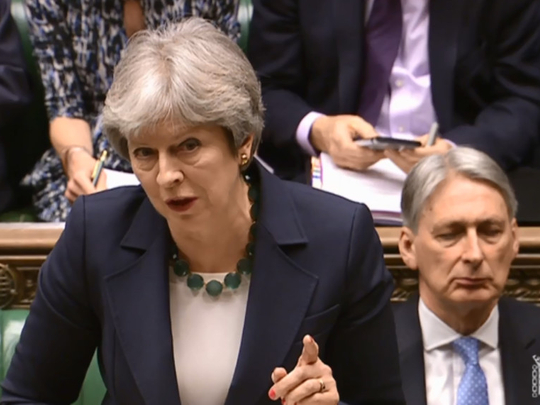
The foreigner’s political eye can be innocent, failing to see the tangled vernacular in an unfamiliar land. But it can sometimes see the big political picture with greater clarity. Foreigners can see what Americans struggle to accept about their terrible gun culture.
First, politely, Wolfgang Ischinger at the Munich security conference week before last. Ischinger is an anglophile, a global thinker, a former German ambassador to Britain. As chairman of the Munich conference, he interviewed British Prime Minister Theresa May, very deliberately telling her that Brexit was “highly regrettable” and that “Things would be so much easier if you stayed”. May smiled icily at this, like the political hostage she is. There is Fintan O’Toole in the Irish Times last week with a blisteringly sarcastic column.
Britain is a cat up a tree, he writes. It needs to climb down, but it hisses and claws at those who clamber up ladders to offer a hand. It’s time for the European Union (EU) to cajole the hissy cat out of its tree with 15 exasperatedly contemptuous concessions to England — yes, O’Toole gets it that Brexit is mainly about the English. Brexit is a pity.
Brexit is stupid. Brexit is an act of English self-love. It is obvious that there are points to be made against each of the foreign critics.
Yes, the German political class is far too complacent about the nation state and Europe. Yes, O’Toole ought to know there is more to Britain than boozy, brassy tabloids and infatuation with the war — sometimes. But the bigger picture is that the critics are right. They get it. And they speak for the overwhelming majority of the rest of the world — or at least the bit of the world that doesn’t welcome the weakening of the rules-based order, of international standards, and of open, pluralistic liberal societies.
Politically and morally, Brexit will always comes back to Britain’s relationship with Ireland. There can be no hard Brexit without a border in Ireland, and the choice you make on this defines you. Six days ago, the former Northern Ireland secretary Owen Paterson, a recklessly hard Brexiteer in the Rees-Mogg mould, endorsed the view that the Good Friday agreement, which brought 30 years of killing and rioting to an end, has “outlived its use”. This is a resonant moment. It is the moment when the Brexit fanatics appeared to be happy to take the risk of Irish people killing each other — and killing British people too — for the good of Brexit. Actually it’s more. It is the moment when parts of the Tory party seemed to be saying that 20 years of peace in Northern Ireland was positively undesirable because it had legitimised the gunmen. Not just not worth preserving — but positively worth destroying. That’s more than a pity, and it’s more than stupid. It is dishonourable. It’s also unneighbourly.
When an electorate does something wrong — such as elect Silvio Berlusconi, the former Italian prime minister, or vote for Brexit — it isn’t the end of the matter. Yet, there are always contrarians who insist on blaming the defeated side rather than the winners. It’s the fault of the previous consensus, they say. There was always something rotten in the established view, they insist.
Get over it, they continue. Look for the opportunities lurking in the setback. That’s what a group of so-called “brains for Brexit” are now doing. These academics think that anti-Brexiteers should move on, be more open-minded about their own faults and think afresh about the possibilities of Brexit. They think everything isn’t really as awful as the Remainers claim. Some interesting people are involved in this little project, people with ideas that are worth thinking about, people who are worthy of serious respect. Some of what they say is genuinely worth considering, as alternative views always are. But these things don’t make them right.
There are some academics who can’t see a consensus without revolting against it. And the truth is that the academics will be fine under Brexit. Their jobs are secure. They will go on writing books about the mistakes that the rest of the world will always make. As this episode reminds us, foolishness is evenly distributed between the clever and the not-so-clever.
A reasonable person has to accept that Brexit may happen and that, if it does, life will go on. However, that does not justify or excuse Brexit. There are serious material and domestic political reasons for opposing it — the loss of jobs, higher-priced imports, weakened safeguards at work and elsewhere. But there is also a bigger picture.
That bigger picture is the importance of liberal democracy’s ability to play the long global game. Liberal democracy has a fight on its hands in the 21st century. It has to maintain the place of rights, freedom, openness and coexistence in a world increasingly marked by nationalism, religious sectarianism, criminal greed and arms proliferation, all amid a changing global balance driven by the rise of Chinese power and the decline of American moral authority. We have to hang in there.
Brexit brings nothing at all to this long game. It only undermines it. Britain’s foreign friends see this from their vantage points. Britons also needs to see it from theirs. For Britain to do its bit in the world, Brexit must be softened and eventually reversed. It may take time. But we are in a long game.
— Guardian News & Media Ltd
Martin Kettle is an associate editor of the Guardian.










